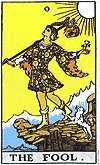
The name 'Scaramouche' is taken by me from a character of that name in a book by Rafael Sabatini, although it has much earlier origins. The earliest references I have found is the play Scaramouche the Hermit performed in France around 1669, presumably written by a contemporary of Moliere, and that Scaramouche is supposedly a braggart, a figure of the Commedia dell'Arte (the Italian form of extempore comedy), created by Tiberio Fiorillo around 1640. There may be even earlier references: Scaramucca or Scaramazza are possibles.
Sabatini's book has one of the most oft-quoted non-classical lines in literature as its opening sentance: "He was born with a gift of laughter and a sense that the world was mad." - the sentiment is repeated on the author's headstone in Adelboden, Switzerland as a fitting epitaph.
Scaramouche tells the story of a somewhat indolent and carefree young man, Andre-Louis Moreau, who is jolted into the reality of his times (the French Revolution) when his poet friend Philippe de Vilmorin is deliberately forced into a duel against the sword master, the Marquis de La Tour d'Azyr - the outcome was naturally foregone and to the Marquis, another troublesome republican is laid to rest.
Moreau embarks on a series of adventures, supposedly to continue his dead friend's beliefs even though he does not share them himself. Soon marked as a traitor, he joins a travelling group of actors. Before long, circumstances conspire that he should play "Scaramouche" on stage and in front of the Marquis. Unable to contain his hatred, he lampoons the nobility unmercifully and draws fresh chase apon himself. It would not be a Sabatini if there were not romance in there too. Moreau falls desperately in love with Aline de Kercadiou, though the course of their love is by no means smooth.
I shall divulge no more and spoil what is a rattling good story. If you think you have seen a film of the name, then you will be correct, though the Stewart Granger telling - made in 1952 some 2 years after Sabatini's death and clearly cashing in on the name - is an appalling travesty of the book. Anyone considering the story would be forgiven for dismissing it out-of-hand if the film is all they have to go by - please don't and if you get the chance to read Sabatini's offering, I urge you to do so. On the other hand, any opportunity to view the film should be avoided like the plague.

A number of FREE downloadable electronic versions of many Sabatini books, including Scaramouche, can be obtained from the The Online Books Page as follows:
Visit the on-line Sabatini page at: http://digital.library.upenn.edu/books/
I suppose none of this explains why the name should be my choice of nom de plume or whatever. Scaramouche is occasionally associated with the "Fool" in the pack of Tarot cards, again something which has obscure ancient origins, though the name I think really means "troublemaker", which would probably best explain why I should choose the name for my web-site. I guess in truth I don't know for sure, it's unusual and rolls nicely off the tongue - as well as being sufficiently unique for the internet, which gives it that tiniest edge over some of my other favourite words like "linoleum" and "marmite".
Other meanings for The Fool are "New Beginnings, Surprises and Optimism". I don't know about that.